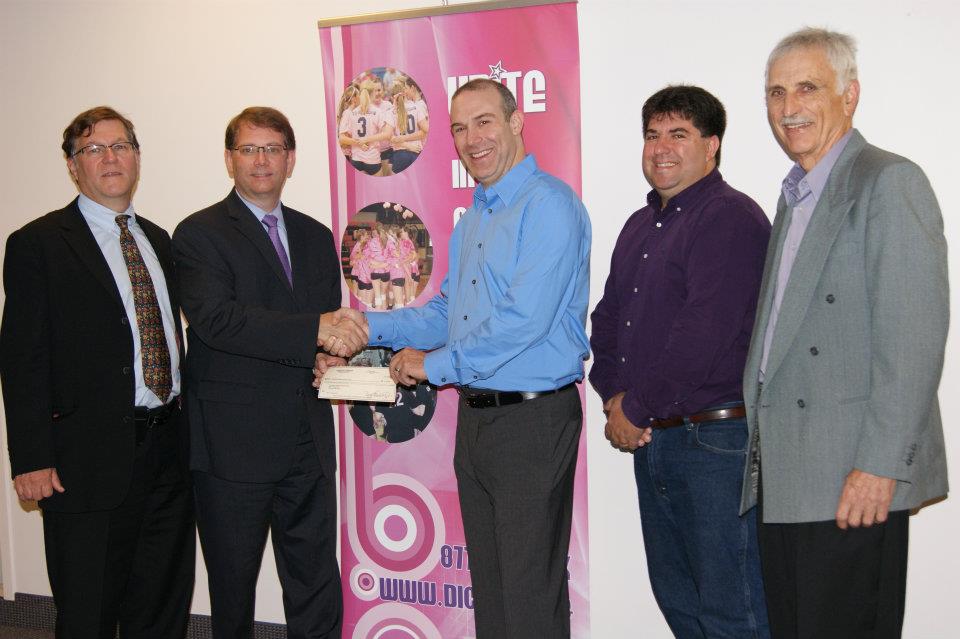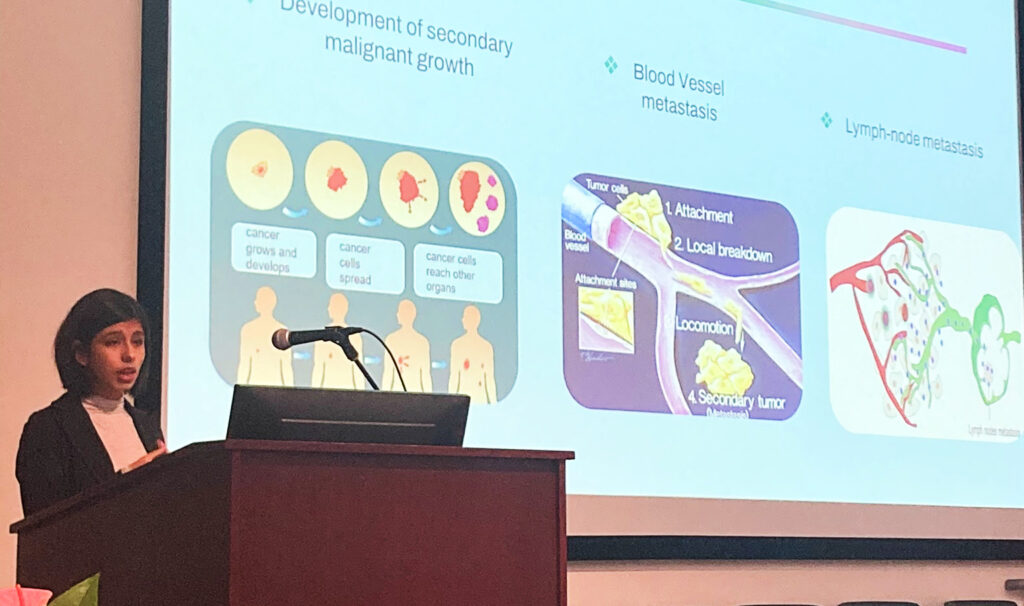
Rick Dunetz presents the check to FNIH (from left to right: David Wholley (director, The Biomarkers Consortium, FNIH), Dr. Scott Campbell (executive director and CEO, FNIH), Rick Dunetz (founder and executive director, Side-Out), Dr. Emanuel (Chip) Petricoin (co-director, GMU Center for Applied Proteomics and Molecular Medicine) and Bryant Dunetz (Rick’s dad and COO, Side-Out))
From www.fnih.org (Side-Out Foundation Awards $160K to the FNIH to Support Breast Cancer Trial).
Bethesda, MD (September 29, 2011) – The Foundation for the National Institutes of Health (FNIH) announced today that The Side-Out Foundation, a Virginia-based non-profit that supports advances in therapy for cancer patients, has donated $160,000 to the I-SPY 2 breast cancer clinical trial.
The I-SPY 2 (Investigation of Serial Studies to Predict Your Therapeutic Response with Imaging And Molecular Analysis 2) trial, launched in 2010 by the FNIH Biomarkers Consortium, is a groundbreaking clinical study that is testing new individually targeted breast cancer drugs in patients diagnosed with localized, aggressive cancers.
“We are proud to have Side-Out as a partner supporting the I-SPY 2 trial,” said Dr. Scott Campbell, Executive Director and CEO of the FNIH. “The Foundation’s ability to collaborate with unique organizations provides critical resources to help advance breast cancer research.”
“The Side-Out Foundation is best known for its cutting edge clinical trial focused on patients with metastatic breast cancer. Supporting I-SPY 2 at the early stage and the Side-Out Protocol at the later stage positions our foundation to cover the full range of the disease”, said Rick Dunetz, Executive Director and CEO of Side-Out.
A major goal of the I-SPY 2 trial is identifying specific molecular signatures (biomarkers) in cancerous tumors that can predict how a patient will respond to a particular therapy. The grant from Side-Out will be used to perform a set of novel genetic tests that can help measure which drugs will be most beneficial for women with different types of tumors. The tests, known as Reverse Phase MicroArray assays (RPMA), have been developed in the laboratory of Dr. Emanuel Petricoin at the George Mason University Center for Applied Proteomics and Molecular Medicine.
“I’m extremely grateful to the FNIH and Side-Out Foundation for providing this critical funding. With this money, we will be able to utilize the power of our RPMA technology to dissect and elucidate the drug target architecture of a heterogeneous disease like breast cancer in a way that has never been done before,” said Dr. Petricoin. “Combining the RPMA pathway mapping approach with a clinical trial like I-SPY 2 where multiple targeted therapies are assessed could be a perfect opportunity to identify key markers that can predict and personalize therapy for cancer patients.”
For more information about the I-SPY 2 breast cancer clinical trial please visit: fnih.org
###
About the FNIH Biomarkers Consortium
Managed by the FNIH, The Biomarkers Consortium is a public-private biomedical research partnership that develops and qualifies biomarkers in order to accelerate the development of new medicines and improve patient care. For additional information, please visit www.biomarkersconsortium.org
About the Foundation for the NIH
Established by the United States Congress to support the mission of the NIH—improving health through scientific discovery in the search for cures—the Foundation for the NIH is a leader in identifying and addressing complex scientific and health issues. The Foundation is a non-profit, 501(c)(3) charitable organization that raises private-sector funds for a broad portfolio of unique programs that complement and enhance NIH priorities and activities. For additional information about the Foundation for the NIH, please visit www.fnih.org
About George Mason University
George Mason University is an innovative, entrepreneurial institution with global distinction in a range of academic fields. Located in Northern Virginia near Washington, D.C., Mason provides students access to diverse cultural experiences and the most sought-after internships and employers in the country. Mason offers strong undergraduate and graduate degree programs in engineering and information technology, organizational psychology, health care and visual and performing arts. With Mason professors conducting groundbreaking research in areas such as climate change, public policy and the biosciences, George Mason University is a leading example of the modern, public university. George Mason University—Where Innovation Is Tradition.




